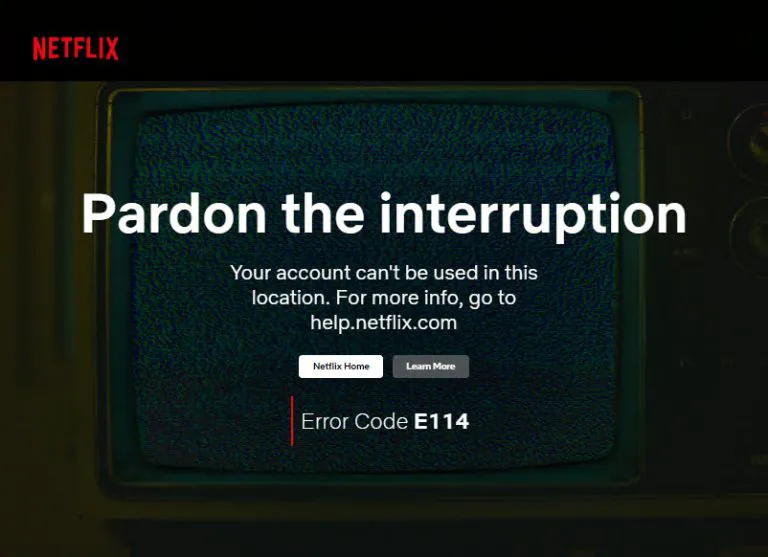Dating Background Check – A Complete Guide for Online Daters

Online dating is fun and exciting. You meet someone new, the conversation flows, and the chemistry feels just right. But… how much do you really know about them?
The truth is, not everyone on dating apps is who they claim to be. It’s easy to fake an identity behind a screen – age, job, marital status, or even a criminal history can be hidden. A survey by eHarmony found that 53% of people have lied on their dating profiles[1]. Worse, some aren’t just stretching the truth – they’re scammers using fake or stolen identities (aka catfish) to manipulate people for personal or financial gains.
Most dating apps don’t run background checks on users[2], and even when they claim to verify identities, it’s usually limited. That’s why many online daters choose to do their own research. And luckily, running a dating background check is easier and faster than ever. With a few simple steps, you can verify an online match and dig deep into their details.
 TL;DR
TL;DR
- Whether you’re looking for peace of mind or just curious, a dating background check can help.
- For a quick, reliable check: use a trusted people search tool like BeenVerified and TruthFinder for detailed background reports.
- Free resources for DIY search: Google, government websites, and local community groups, but be ready for more legwork.
- If anything seems concerning, proceed cautiously and trust your gut.
You might need a dating background check if…
Well, it’s up to you whether and when to do a dating background. It may seem excessive to check everyone you meet on dating apps, but in some situations, it can definitely give you peace of mind, for example:
- You want to verify your online match is genuine and who they say they are before meeting in person.
- You’re starting to get emotionally involved and hope to know more about their past.
- You’ve noticed sketchy inconsistencies in their stories or found them vague about important details.
- You want to prioritize your safety, especially if you have children or have experienced a harmful relationship in the past.
How to do a dating background check
Now let’s walk through the steps to do a dating background check. We’ll cover everything you might need along the way.
Before getting started: gather details for your search
To run a dating background check, you’ll need the person’s full name and city + state they live in. This is essential for identifying the individual you’re looking for, especially if they have a common name. Additional details like their age or middle name can also help narrow things down.
Don’t know their last name? No problem. You can try looking up their phone number or dating app username (or any other social media handle they’ve shared) to uncover the full name.
Also, collect any other info they’ve shared with you, like photos, job title, company, past relationships, or places they lived in, in order to cross-check your findings and spot inconsistencies.
The best bet: use a people search tool for deep background checks
People search tools are like digital detectives that find information about people across the Internet. They aggregate publicly available data from sources like public records, social media, phone directories, and web pages to create a detailed profile of an individual, giving you a clearer picture of a potential partner.
![]() Top Choices Among Daters
Top Choices Among Daters
| BeenVerified | |
| TruthFinder | |
| Spokeo | |
| SocialCatfish |
Step 1: Choose a reliable tool for your needs
There are plenty of people search tools around, each with its strengths and weaknesses. Some specialize in certain types of information, while others may be better at tracing social media activity or offering a range of search options. When picking a tool, think about the kind of information you’re looking for, what details you already have, and how often you plan to run background checks.
 Still not sure which tool suits you? Tell us what you need in the comments, and we’ll help you pick the best option.
Still not sure which tool suits you? Tell us what you need in the comments, and we’ll help you pick the best option.
Is it worth paying for a background check?
I’d say yes, absolutely. A comprehensive background check report can clear up a lot of questions you might have about a potential partner. Sure, you can try to piece together the info yourself, but it will likely take hours or longer – we’ve been there. A paid report, however, delivers a wealth of essential details in minutes. For the cost of a few coffees, you can gain peace of mind and avoid potential headaches later on.
Are there free people search tools?
In fact, there are no truly free background checks. Although some people search sites advertise themselves as free, their free results are only the basics, like name, age, or contact, which may not be sufficient to fully understand a potential date. For more valuable data like court records or social media profiles, you’ll still need to pay.
We’ve compared two popular free people search sites with our top paid option, so you can see exactly what’s missing out.
| TruePeopleSearch Free | FastPeopleSearch Free | BeenVerified Paid | |
| Name |  |  |  |
| Address history |  |  |  |
| Email addresses |  |  |  |
| Phone numbers |  |  |  |
| Social media profiles |  |  |  |
| Photos |  |  |  |
| Possible relatives & associates |  |  |  |
| Possible marital records |  |  |  |
| Possible divorce records |  |  |  |
| Criminal & traffic records |  |  |  |
| Bankruptcies, judgements & liens |  |  |  |
| Jobs |  |  |  |
| Education |  |  |  |
| Assets |  |  |  |
As you can see, even the best free people search tools don’t provide you with anywhere near as much useful information as a good paid service.
If you really want to do it free of charge and don’t mind investing extra time, we’ve put together a list of methods to search public records manually.
Step 2: Conduct a background search
Below I’ll use BeenVerified as an example for the process.
- Go to the people search site.
- Choose your preferred search option and fill in the details.
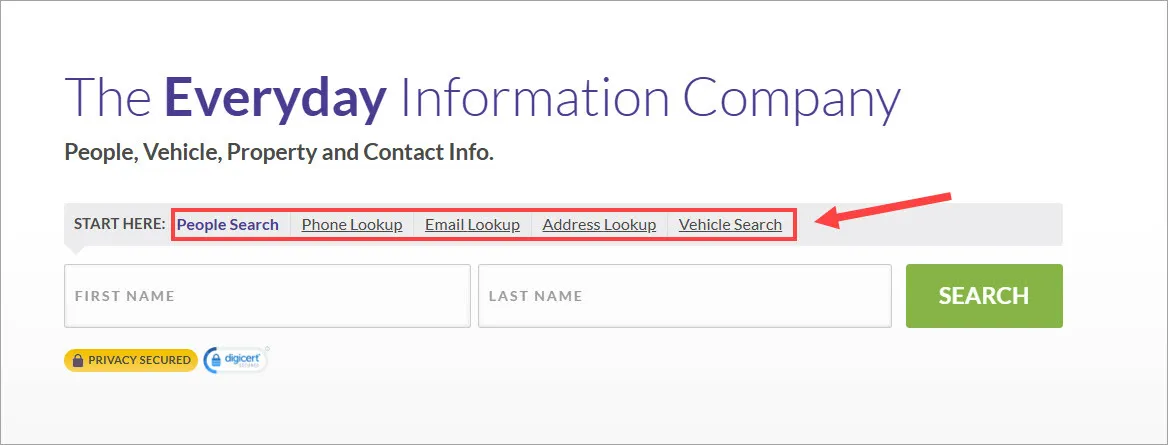 The search is private and anonymous, so your date won’t know you’re checking them out.
The search is private and anonymous, so your date won’t know you’re checking them out. - The search will take about 2-3 minutes. During this time, you may be asked for additional details like the person’s city or age to refine the search. Skip them if you’re unsure.
- Once it’s ready, sign up for the service to unlock the full report.
Step 3: Review the results and look out for key details
A people search report typically contains both basic information and more in-depth details such as jobs & education, criminal and traffic history, marriage & divorce records, and more. When reviewing the report, here’s what to focus on:
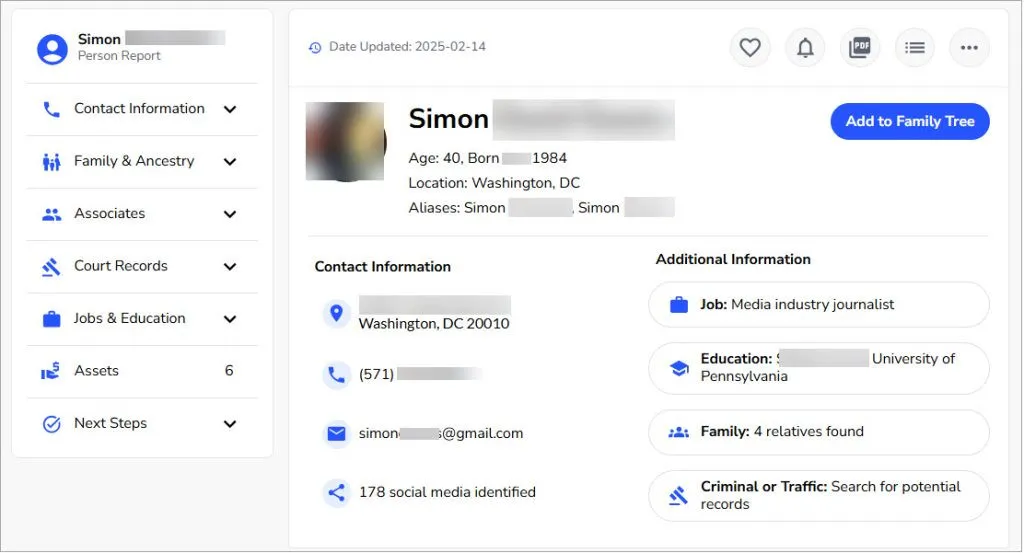
Check full name, alias, photos, addresses, jobs & education to see if these details line up with what they’ve told you.
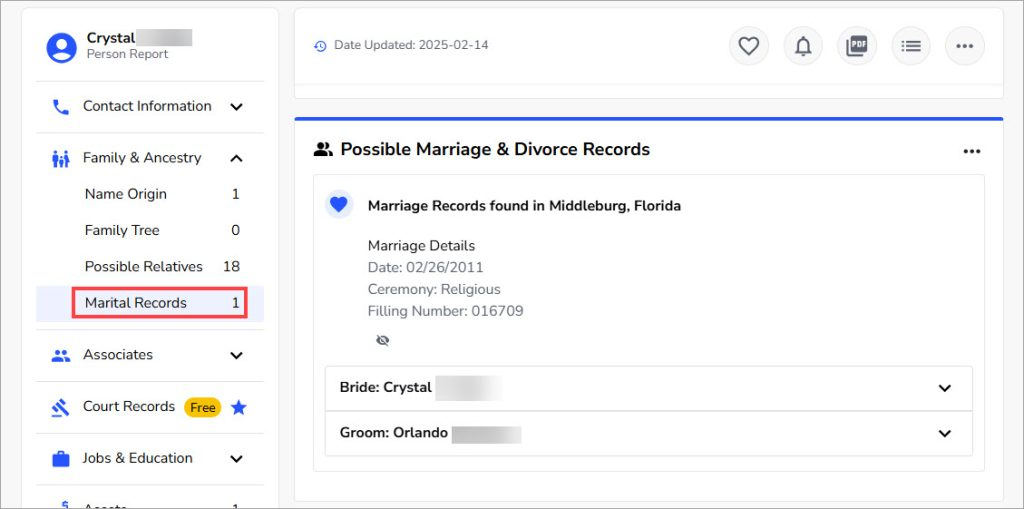
Does the report reveal a marriage or divorce record that you weren’t aware of? Or is there a hidden family member appearing in the possible relatives and associates list? If you discover relationships or marital history that your date has kept secret, be wary.
Read more: How to find out if someone is married – a thorough guide
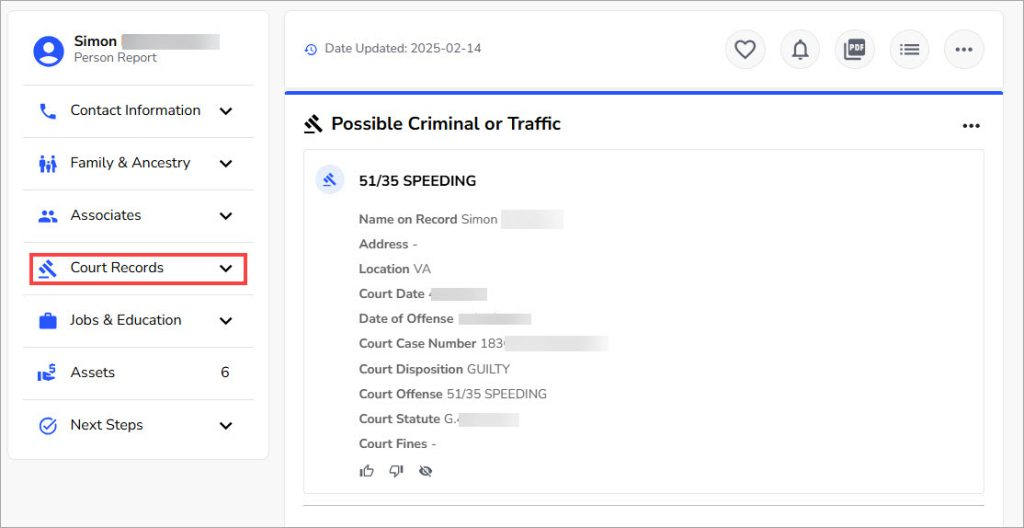
While minor infractions like traffic violations or old misdemeanors might not be a big deal, serious offenses especially related to domestic violence, harassment, sex offenses, or fraud should be treated with caution.
Read more: How to see if someone is a registered sex offender
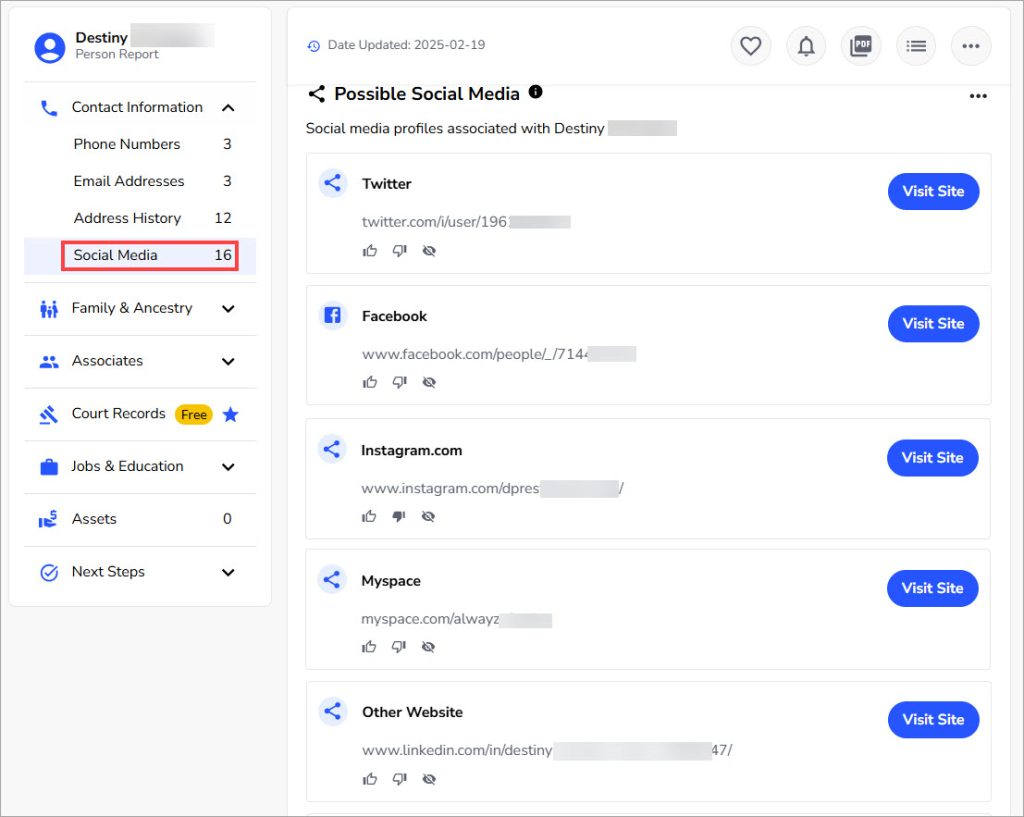
Through someone’s online activities, you can often have a deeper sense of someone’s interests, personality, and lifestyle. See if they hide anything significant or present a different persona than they do on the dating app. You may also want to learn if your values align before getting too invested.
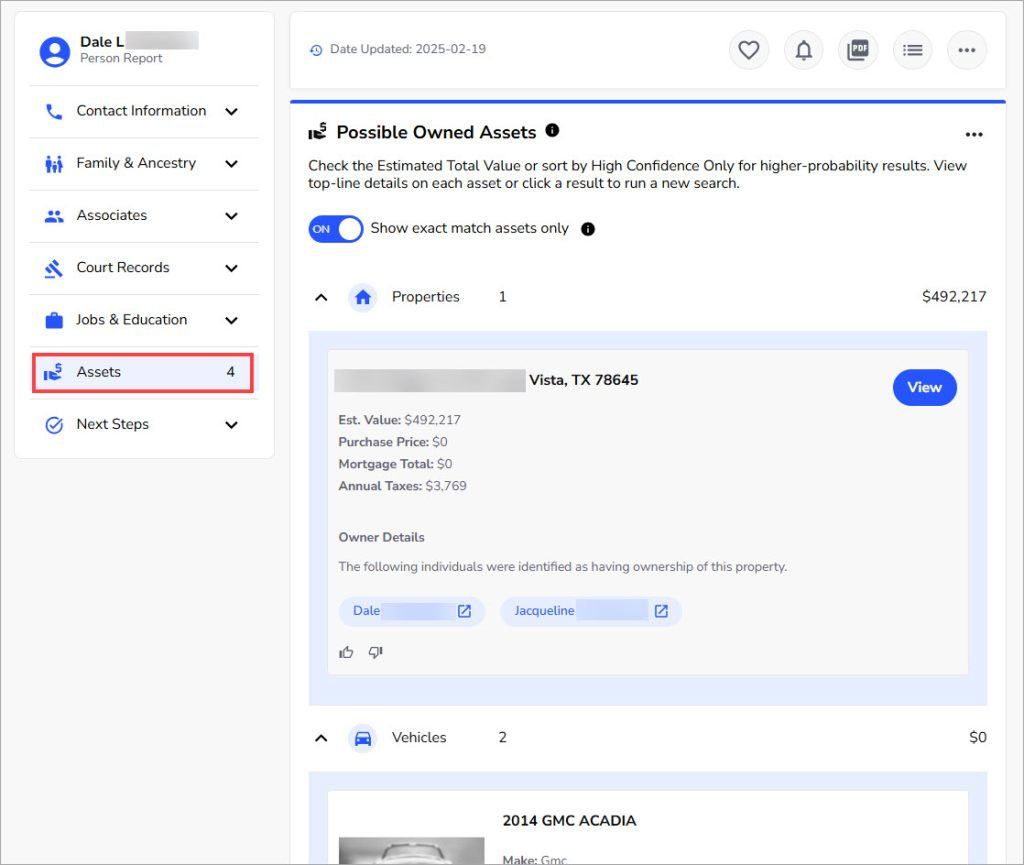
Bankruptcies or liens can be warning signs of financial trouble and even hint at deceptive intentions. Asset information in the report, like possible properties or vehicles, can give you further insights into their financial stability and help you tell if they’re exaggerating their wealth.
A reminder about the report’s accuracy
While people search reports provide plenty of valuable information, they aren’t 100% complete and accurate. These tools don’t generate data but aggregate it from wide-ranging public and commercial sources, which, even including government records, can be missing or outdated.
Besides, what shows up on the report varies by person. Privacy-conscious individuals tend to have less information connected to their names. If the person has opted out of the people search sites, a right permitted by privacy laws in the US[3], you won’t find their report either.
Read more: Why People Search Sites Can’t Always Find What You’re Looking For?
Therefore, we recommend using the background check report as an important reference but don’t rely on it alone. Always combine it with your own judgments and direct interactions when making your decisions.
DIY option: search manually for free
Free searches can be effective but will require a bit of patience and persistence. Here’s how to dive in.
Google is a great starting point
Google is often the first place we turn to when looking for information about someone, and for good reason, it’s fast and easy. Type in the person’s name or any other details you know, and voilà, a world of results.

Not getting what you need? Try these tips for more focused results
1. Combine relevant keywords, such as a couple of details about the person:
- First name + last name + city and state
- First name + last name + company
- First name + last name + city/state + profession/industry
Or specify the information you’re looking for:
- First name + last name + arrest or court records
- First name + last name + the name of a social media platform (Facebook, LinkedIn, Instagram, etc.)
2. Use search operators
- Quotation marks (e.g. “John Smith”) – This ensures you get exact matches for names or phrases, cutting out irrelevant results.
- Filetype (e.g. John Smith filetype:pdf) – This limits the results for specific file types such as PDFs or Word documents and might lead you to some useful documents like resumes or reports.
- Site (e.g. John Smith site:example.com) – If you know a website that’s relevant, maybe their company website or blog, you can search that website for targeted results.
3. Explore alternatives if Google doesn’t yield satisfying results
Try searching on Bing, Yahoo, and DuckDuckGo. They might surface resources that Google misses as each search engine has its own algorithms. If you’re dating someone from another country, it’s a good idea to use the local search engine. For example, use Baidu for China, Naver for South Korea, and Yandex for Russia.
Most people today have some sort of digital presence unless they deliberately keep a low profile for privacy reasons. Particularly, if the person claims to hold a high-profile position at a well-known company or is supposed to be active online, there should be some trace of them. If you find nothing at all, consider it a red flag.
You can search for public records through government sources
In the U.S., a wide variety of records such as court records, marriage licenses, and property records are made available to the public, and you can usually access them through the appropriate government sources.
1. Check local court records
Since most crimes are handled at the county level, the county court records are often the most reliable source of criminal history. Not sure what county your date is living or has lived in? No worries, state records can work too. But be aware that some states might not include all county records in their databases.
1. Search county + state + criminal/court records on Google to locate the official website (e.g. clay florida court records in the screenshot).
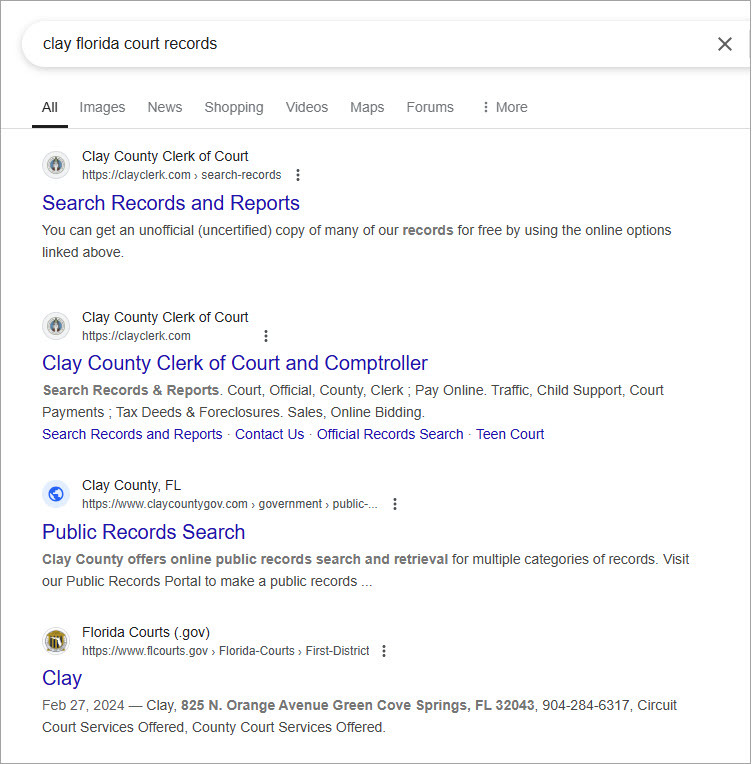
💡 Make sure you visit an authentic government website, which typically ends in .org or .gov. Many sketchy sites are posing as official government sources. Take a closer look at the top or bottom of these websites; third-party ones usually have a disclaimer like “Our website is privately owned and is not owned by any state government agency”
2. Once you’ve found the official source for court records, enter the person’s full name in the required format and review the information presented.
Facts to know about public records
- Public record access varies widely by jurisdiction. Depending on where you’re searching, the types of records you can access and the level of detail available can differ. For example, some states may restrict access to marriage records or withhold the specific details of an arrest.
- Not all public records are easy and free to access. Many states host an online database for public records, but some, such as Louisiana, Mississippi, and Wyoming, require you to submit requests to access statewide records. Although these states may lack a centralized digital database that you can search directly, some counties within these states may still offer online access to their local records.Want to find someone’s address history without asking them directly? Check out this guide: How to Find Someone’s Address by Name.
- Criminal history doesn’t follow people across states. If someone has a criminal record in one state and moves to another, their criminal history may not show up in the new state. To get the most complete information, you’ll need to know all the counties and states they lived in and search each one separately.
- Violent crimes aren’t always reported. Many abusive behaviors go unreported within the criminal justice system. In fact, a survey showed that only 310 out of every 1,000 (less than ⅓) sexual assaults are reported to the police[4]. So, even if someone’s record appears clean, this doesn’t necessarily tell the whole story.
2. Check sex offender registries
The National Sex Offender Public Website (NSOPW) allows you to search for sex offenders in all jurisdictions at once. You can search by name to see if someone is a registered sex offender or by address to check sex offenders nearby.
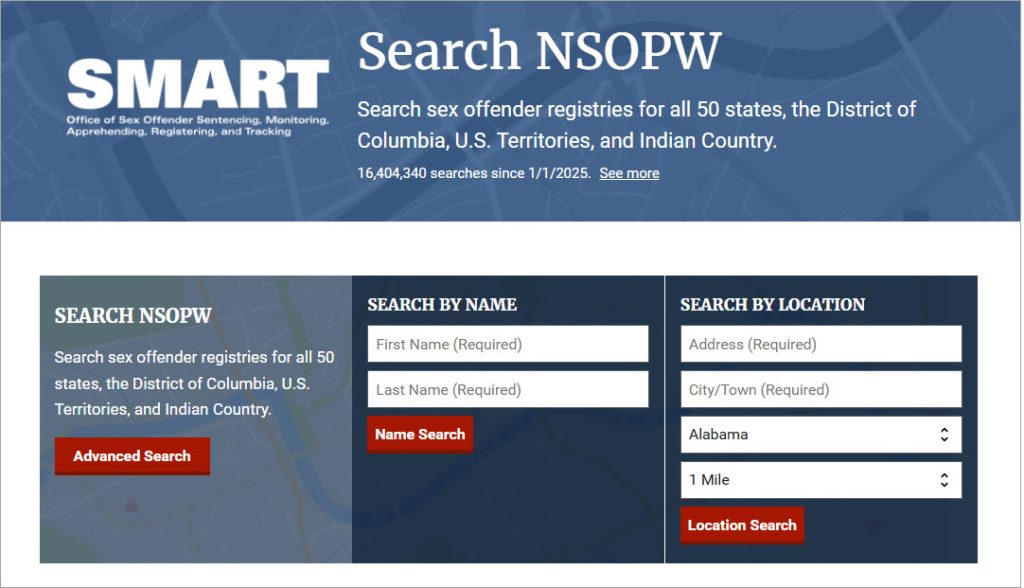
3. Check federal criminal records
Federal crimes are often more severe than state-level charges and may span multiple jurisdictions. Most daters won’t need to search for federal criminal records. But if you want to be extra thorough, you can check it on PACER (Public Access to Court Electronic Records), an online federal record system.
- To use this tool, you’ll need to create an account first and provide your credit card information.
- You can search for federal court records by case number or part name.
- The search comes with a fee, based on the amount of pages generated. If you search for a common name, it may return a large number of pages and rack up a higher bill.
- If your total charges are $30 or less within a quarter, the fees will be waived for that period. For more pricing details, refer to PACER FAQs.
Don’t forget to check their photos
A common tactic of romantic scammers is using fake or stolen pictures to create an appealing persona. Fortunately, it’s not hard to catch them with a reverse image search tool. Just upload a photo of your date to these websites and they will tell you where the pictures (or visually similar ones) have appeared online.
Here’s a list of tools to try:
- Google Image
- TinEye
- PimEyes
- Sightengine (for detecting if an image is AI-generated)
If the results show that the image is a stock photo or tied to a different name, that’s a strong indicator of catfishing. If the photo is genuine and your date has used it on other websites or platforms, like Facebook or Instagram, you might find those sources.
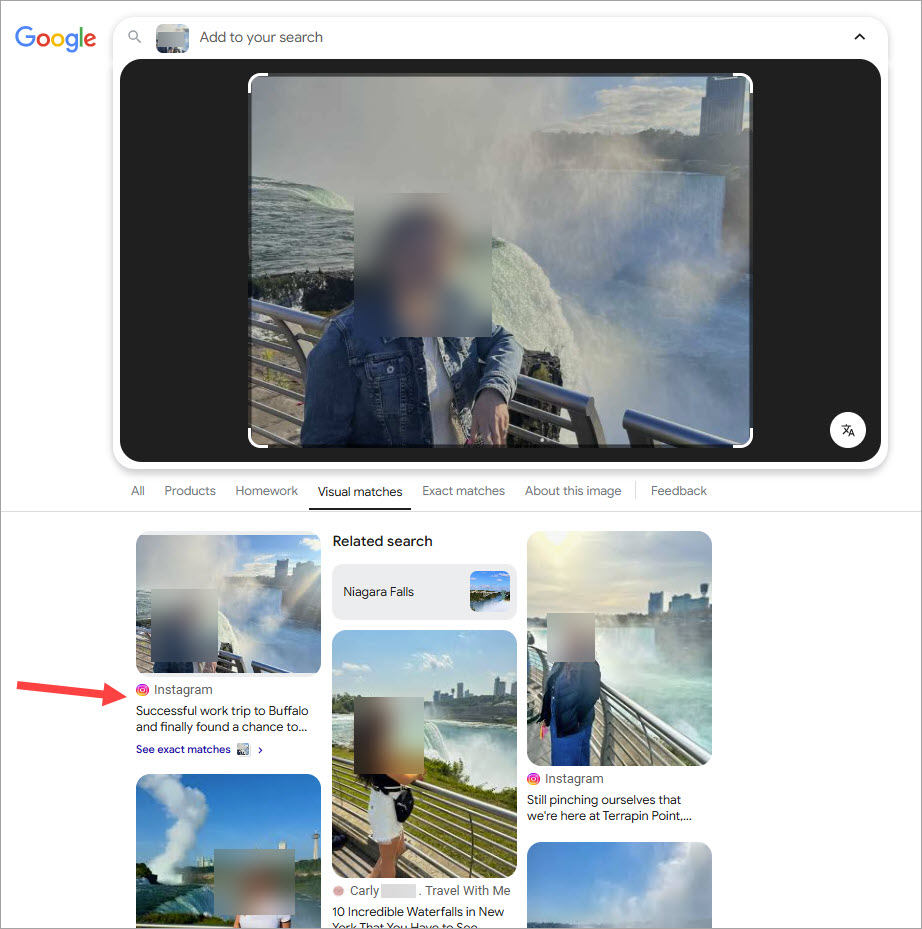
Don’t be surprised if you don’t find anything. That’s because many people will use unique photos for dating profiles that they haven’t posted anywhere online. Besides, these free tools aren’t built for precise facial recognition. They focus on analyzing the image itself, so people-based results can be limited.
Local networks might offer insider clues on romantic scammers
The Facebook group “Are We Dating The Same Guy” is designed for women to share information and protect each other from potential liars, cheaters, or abusers. To find your local group, simply search are we dating the same guy + city or state on Google.

Once you’re in (you’ll need to request access), you can ask if anyone has information about someone you’re dating or planning to date. It’s also a place where you can warn others of any red flags or harmful individuals you’ve encountered.
What to do if you find something suspicious
If you find something that raises an alert, take a moment to pause and think things through calmly.
- Your safety is the top priority. If you’ve found something serious like a fake identity, a hidden marital status, or a criminal history that could threaten your well-being, it’s best to cut off the communication and walk away. Some minor discrepancies might not be a deal-breaker, but if you feel uneasy, it’s ok to step back.
- Have an open conversation. Just because something seems off doesn’t necessarily mean there’s a major issue. Everyone has a past and past mistakes don’t always define who they are now. If you feel comfortable, talk to your date about what you’ve discovered and see if they have a reasonable explanation.
- Seek advice and support from someone you trust. If you’re feeling unsure or overwhelmed, it’s always helpful to talk things over with a friend, family member, or anyone who can offer an unbiased perspective.
Final thoughts
It’s crucial to stay vigilant and informed when you’re online dating. While many people online are genuine, some may not be who they say they are. Doing a little research, whether it’s a quick Google search or a thorough check using a people search engine or government sources, can better protect you from physical or emotional harm.
Remember, a dating background check is just one piece of the puzzle. Trust your intuition and how you feel – it’s just as important in making the right decisions.
- eHarmony Editorial Team. (2021, March 18). 10 Online Dating Statistics You Should Know. eHarmony. https://www.eharmony.com/online-dating-statistics/↩
- Match Group, the owner of popular dating platforms like Tinder, Match.com, OkCupid, Hinge, and Plenty of Fish, had partnered with Garbo, a non-profit organization, to offer background checks. It let users run a limited number of free background checks on a potential date using their last name and phone number. However, the partnership was discontinued in 2023.↩
- Pheaden. (2024, September 10). Which States Have Consumer Data Privacy Laws? Bloomberg Law. https://pro.bloomberglaw.com/insights/privacy/state-privacy-legislation-tracker/↩
- The Criminal Justice System: Statistics. Rainn.org. https://rainn.org/statistics/criminal-justice-system↩


 View all of Brinksley Hong's posts.
View all of Brinksley Hong's posts.


